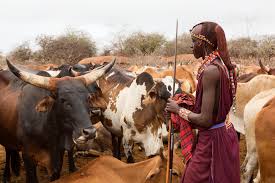Sustaining Maasai Livelihoods in Kenya's Chyulu Hills A Beacon of Hope Against Climate Change
JOURNAL


The Struggles of the Maasai Pastoralists
The Maasai pastoralists have long been stewards of the Chyulu Hills, a region characterized by its rich biodiversity and unique ecosystems. For generations, these communities have practiced transhumance, moving their livestock between seasonal pastures to optimize grazing opportunities. This traditional lifestyle has allowed them to adapt to the naturais of the environment, ensuring their survival despite occasional climatic fluctuations. The Maasai have developed a profound understanding of their surroundings, balancing animal husbandry with the need to conserve water and forage in an ever-changing landscape.
The Forest Carbon Project: A Collaborative Initiative
In an effort to combat climate change while supporting local communities, Conservation International, alongside its partners, has launched the Forest Carbon Project in Kenya’s Chyulu Hills. This initiative seeks to mitigate the impacts of deforestation and degradation while fostering sustainable livelihoods for the Maasai community. Through a collaborative approach, the project aims to balance environmental conservation with economic development, creating a model that could be replicated in other vulnerable regions.
One of the central goals of the Forest Carbon Project is to create a carbon offset program that not only provides financial resources for local communities but also incentivizes the preservation of forested areas. By effectively monitoring forest carbon stocks and implementing sustainable land management practices, the project seeks to generate funding through the sale of carbon credits. These credits are essential in combating the adverse effects of climate change, as they represent a tangible commitment to reducing greenhouse gas emissions.
Community involvement is vital to the success of the project. Local Maasai people are actively engaged in the planning and execution of conservation activities, providing them a stake in the health of their environment. Workshops and training sessions are conducted to educate community members about sustainable practices and the importance of forest conservation. This participatory approach not only empowers the Maasai to protect and advocate for their natural resources, but it also fosters a sense of ownership over the project's outcomes.
To prevent deforestation, the project implements various strategies, including the promotion of agroforestry, the establishment of protected areas, and the restoration of degraded lands. By integrating traditional knowledge with modern conservation techniques, the Forest Carbon Project exemplifies the significance of community-led efforts in environmental conservation, ultimately serving as a beacon of hope for the Maasai livelihoods within the deteriorating climate landscape.
Impact and Outcomes: A Greener Future
The forest carbon project in Kenya's Chyulu Hills has yielded remarkable results in its efforts to combat climate change. This initiative has effectively prevented approximately 580,000 metric tons of carbon emissions annually. The significance of this achievement is profound, particularly when considered in relation to global efforts aimed at reducing greenhouse gases. To contextualize this figure, the reduction equates to removing about 830,000 gas-powered vehicles from the roads over a six-year period. This substantial decrease in emissions underscores the project's role in driving environmental sustainability while concurrently fostering local resilience.
The measurable impacts of this carbon project extend beyond mere carbon offsetting. By focusing on forest preservation and rehabilitation, the project not only mitigates climate change but also enhances local biodiversity. The area’s rich ecosystems benefit from the reduced disturbances, as habitats for wildlife are preserved and restored, contributing to the broader goals of environmental conservation. The project also offers economic advantages to the Maasai communities residing in the region, aligning environmental goals with local livelihoods.
Moreover, the sustainable management of forest resources generates additional income avenues for these communities. The carbon credits obtained from the project provide financial incentives to ensure the long-term stewardship of the forests. As a result, community members are empowered to engage in eco-friendly practices that support both their economic circumstances and the overarching health of their environment. The cumulative benefits foster a sense of stewardship among locals, reinforcing their commitment to protecting this vital resource. As such, the forest carbon project stands as a beacon of hope in the ongoing battle against climate change, exemplifying a successful model for sustainability that could be replicated in other regions facing similar challenges.
Voices from the Community: Local Perspectives
In the heart of Kenya’s Chyulu Hills, the Maasai community stands resilient, striving for a harmonious relationship with their environment even in challenging times. Community leaders, such as Seif Hamisi of Conservation International, articulate a shared commitment to both cultural preservation and environmental conservation. Hamisi emphasizes the significant impact of climate change on traditional Maasai livelihood, describing changes in rainfall patterns and the increasing scarcity of resources as threatening the very fabric of their way of life.
The Maasai have a profound connection to their land, viewing it not only as a source of sustenance but also as a sanctuary of their cultural identity. Local elders express their hope that sustainability initiatives will empower their community to adapt to these stark climatic changes without sacrificing their heritage. They see the integration of modern conservation strategies with traditional pastoral practices as a key to maintaining their identity and ensuring future generations will inherit a thriving ecosystem.
Community members also highlight the value of collaborative efforts that encourage youth involvement in conservation. Programs aimed at educating young Maasai about sustainable practices promise to bridge the gap between tradition and modernity, nurturing a sense of responsibility towards both their cultural heritage and the environment. This generational shift is vital, as younger individuals are becoming more aware of global challenges, including climate change, and are eager to engage in dialogues that shape sustainable futures.
The Maasai community views the sustainability initiatives in the Chyulu Hills not merely as environmental projects but as essential lifelines preserving their identity, culture, and way of life. Although the path forward is fraught with challenges, the voices from the community convey a message of hope, resilience, and steadfast dedication to preserving the Maasai heritage against the backdrop of climate adversity.
